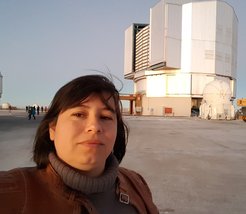Tanya Urrutia
"Perseverance is often more important than knowledge and expertise"

Life
I am currently a researcher at the Leibniz Institut für Astrophysik, Potsdam (AIP), almost for 10 years now. This has been great, because my family from my mother’s side came from Berlin and I was able to care for my grandmother, who was my inspiration to become an astrophysicist, the last few years before she died. I was born in Guatemala, my dad being Guatemalan and having met my mom, while studying in Berlin in the early 70s. Growing up in Guatemala was really great, it gave me a whole different outlook on life, not to take everything too seriously. In high-school, I was glad to find a number of like-minded people that were also interested in astronomy; we went comet-hunting (Hyakutake, Hale-Bopp) and general observing for long weekends at the beach or mountains.
However, since there was no astrophysics degree in Guatemala back when I finished school, I decided to go to Germany to study (astro)physics at the University of Potsdam. After earning my Diploma in 2002, I embarked on another adventure – going to California for 9 years. First in Northern California for 5 years for my PhD studies at the University of California, Davis and then in Southern California at IPAC/Caltech as a Postdoctoral Researcher at the Spitzer Science Center. Since 2011, as I said, I am glad to be back in Germany and at my old stomping grounds and happy to be still successfully involved in astronomy.
Science
My work mainly concerns extragalactic astronomy. I am actually quite involved in the MUSE (and BlueMUSE) instrument, which is a giant, optical 3D spectrograph and use it to study the evolving extragalactic population. However, since quasars play a significant role in galaxy evolution, I am very interested in quasar studies, in particular their demographics and their impact on the host galaxy. My PhD dealt with dust-reddened quasars as a probe of young quasars, the most luminous of are merger driven and display very strong winds. In the X-rays, these represent a significant fraction of the Compton-Thin population and could make up ~20% of the Cosmic X-ray Background. Due to this interest in quasar demographics, I am a member of the eRO-AGN working group and I am tasked with the “External samples” subgroup, following up on the X-ray properties of interesting objects identified in other multi-wavelength surveys. Many of the objects are too faint for eROSITA, hence I developed a stacking tool for eFEDS and in the future will work towards developing such a tool for the eRASS surveys.
Future Projects
Our group just received a large ERC grant to study the Circumgalactic Material of galaxies, which will take up my time for the next 5-6 years. For that I use MUSE and HETDEX in blind searches for emission lines. In the future, I am part of the BlueMUSE consortium, a future VLT instrument, currently under Phase A development. Its possible deploy date is in 2027.
Remarkable scientific moment
For years, when trying to search for dust-reddened and high-redshift quasars, these cool dwarfs tended to be horrible contaminants in our searches. One time we showed our contaminants to the colleagues at the Spitzer Science Center – turns out, we had found a very late T-dwarf (most likely a Brown Dwarf), possibly a record holder which was quite active. We had been “throwing them away”, while in reality they were quite interesting and were subsequently published.
Hobbys
When I can, I like to go geocaching, which is a sort of Treasure Hunt with your GPS. If the weather is not cooperating, I solve the puzzles for Geocaching. Otherwise, I spend some time with my kids and try to find interesting things to do with them
Conclusion
I am actually quite happy how my academic career turned out. I should have probably said “no” to some avenues or have been a bit more focused, but overall, I cannot complain.
My advice to young scientists is that perseverance is often more important than knowledge and expertise, so very early on try to develop strategies that will help you bridge those phases of your studies that are filled with frustration and rejection. Know that a good portion of how your career path evolves is determined by luck and that rejections are a part of being a scientist and any one rejection has in no way anything to say on your worth as a scientist.












